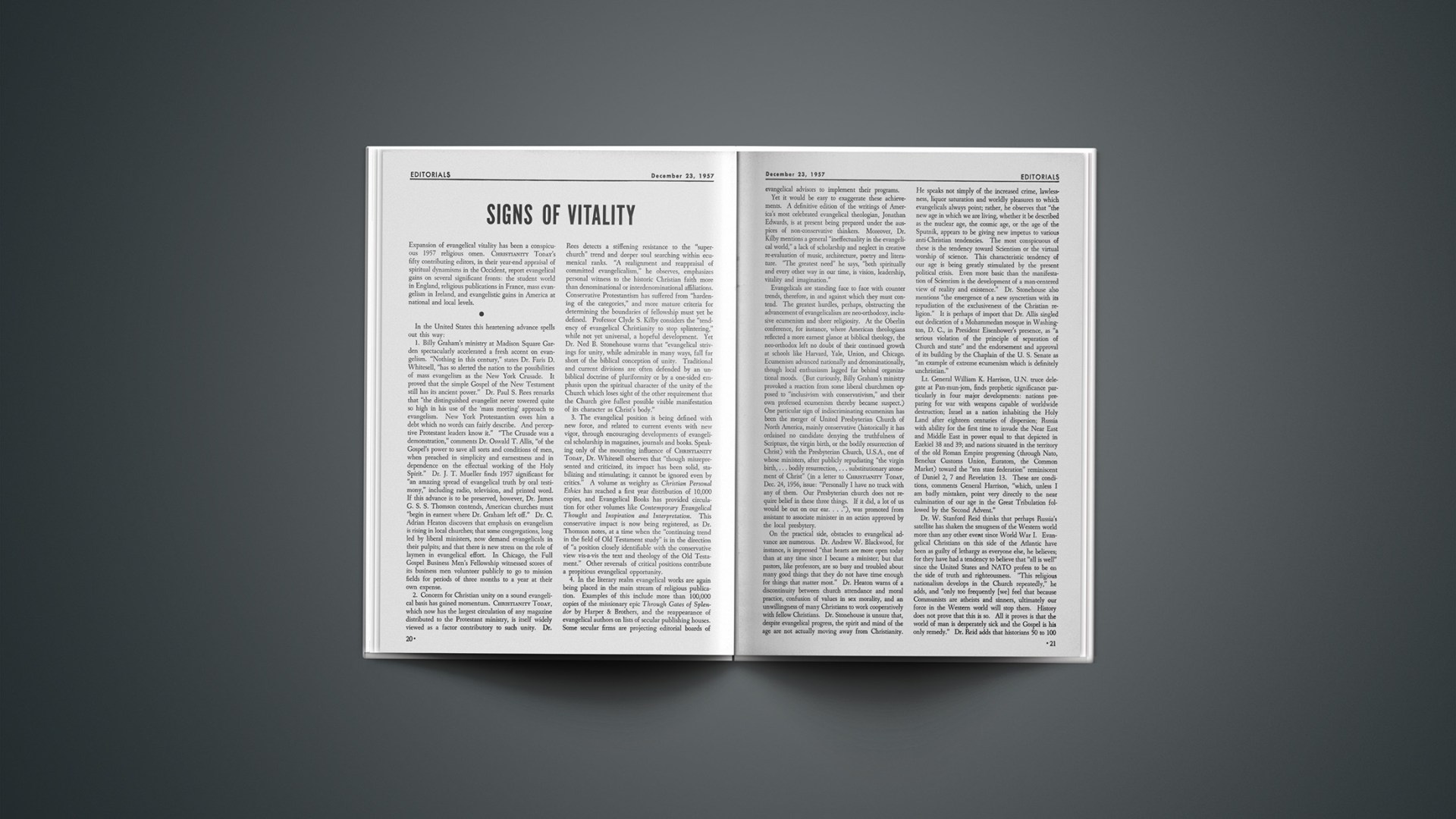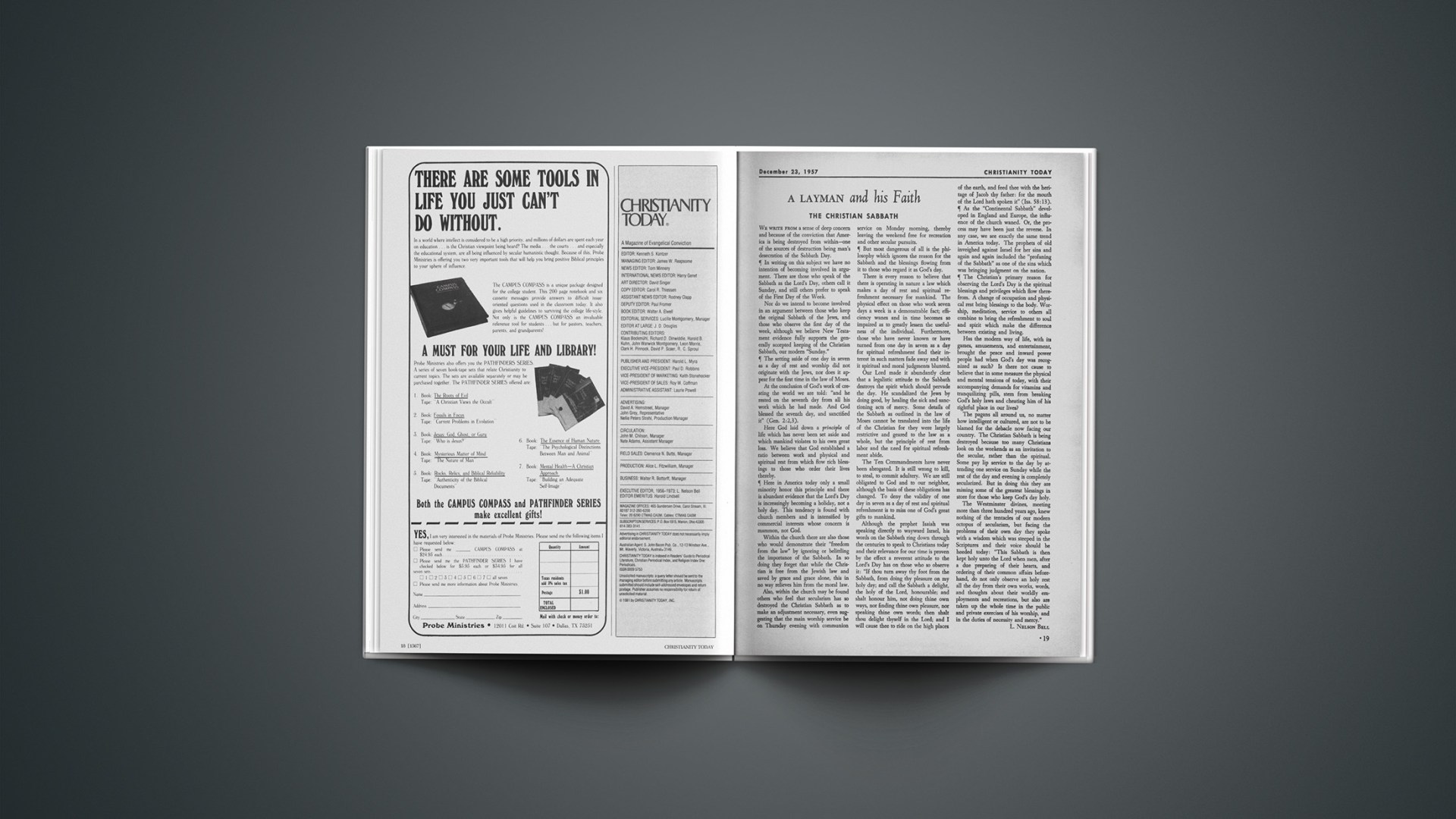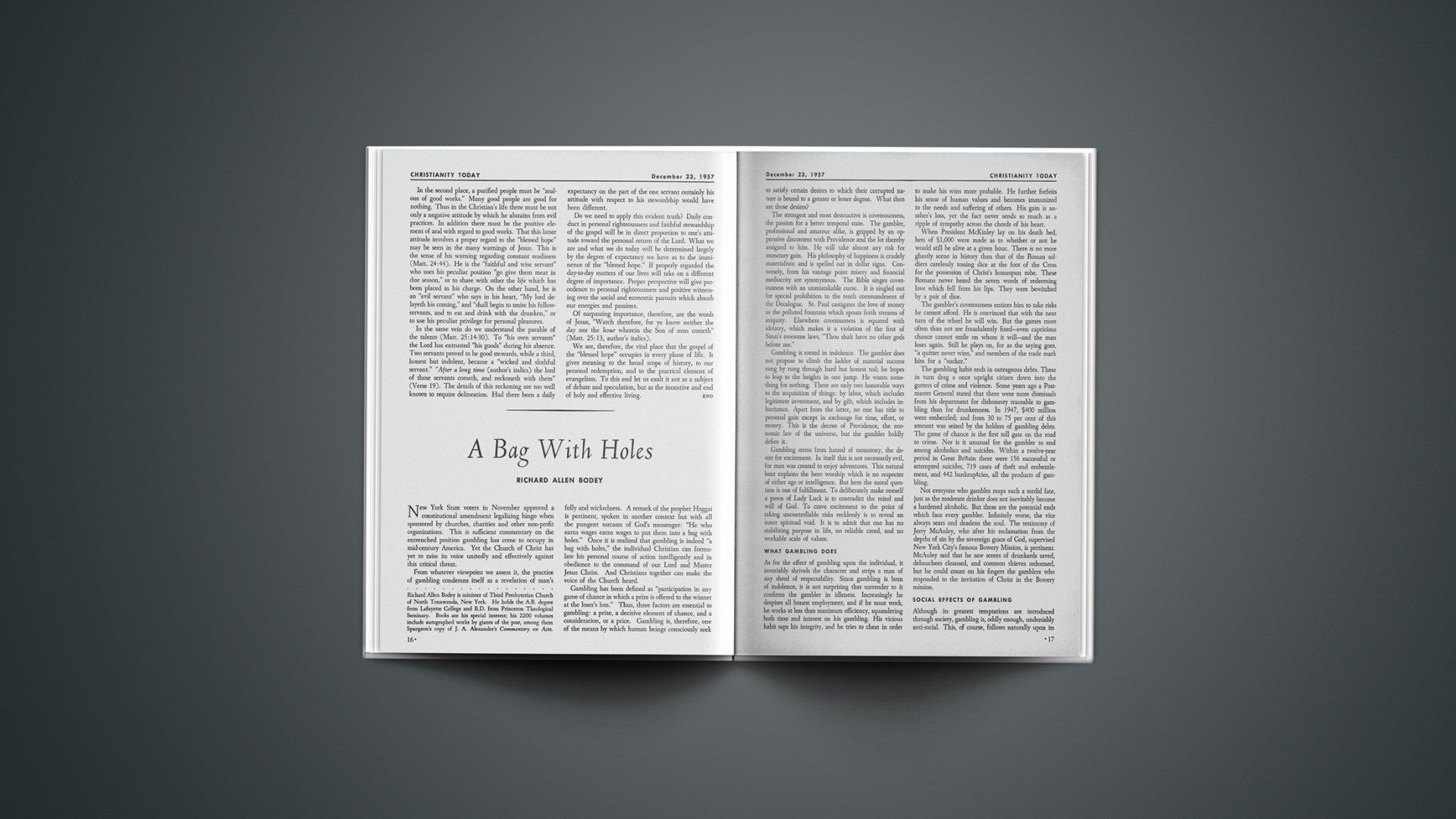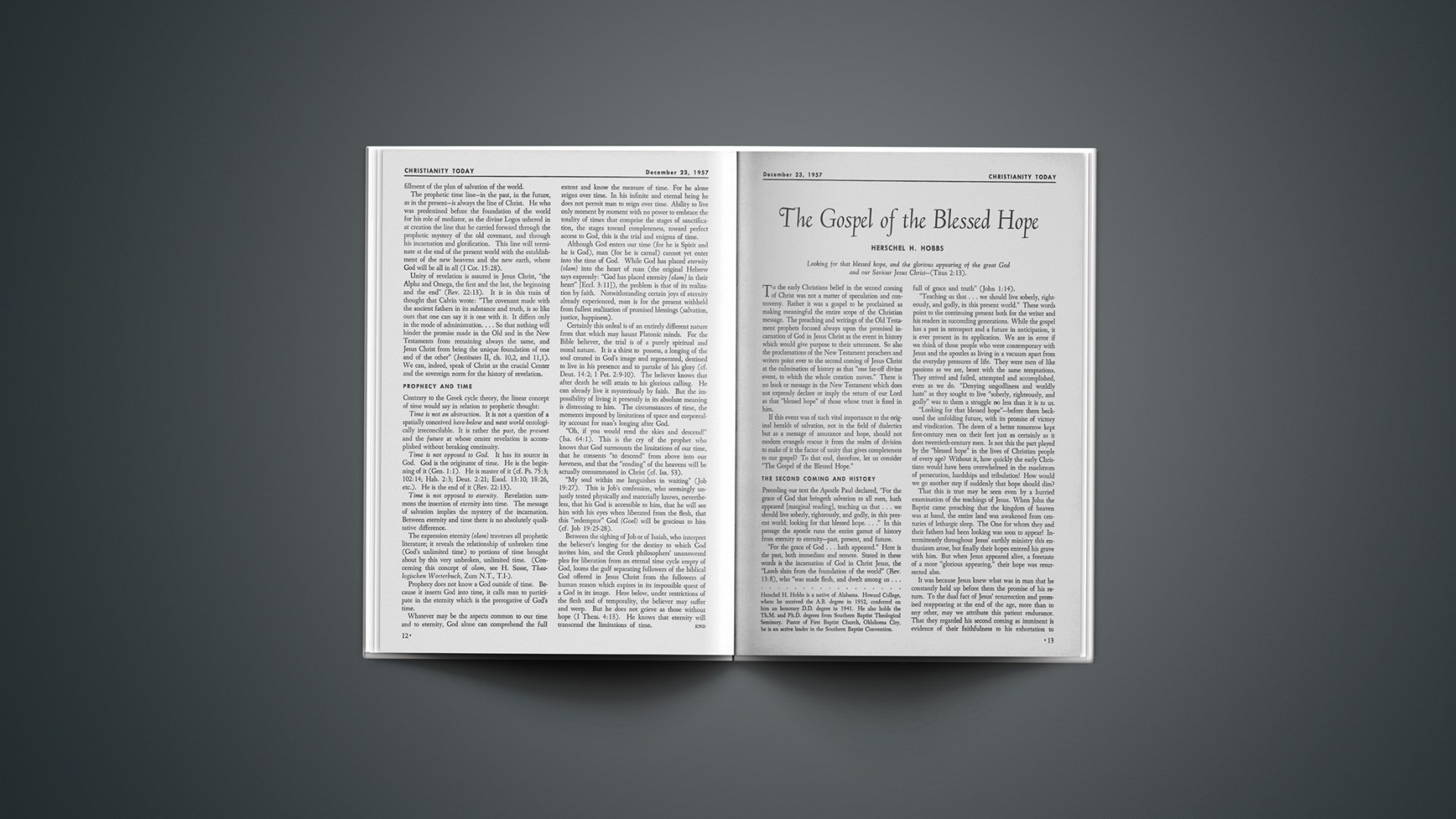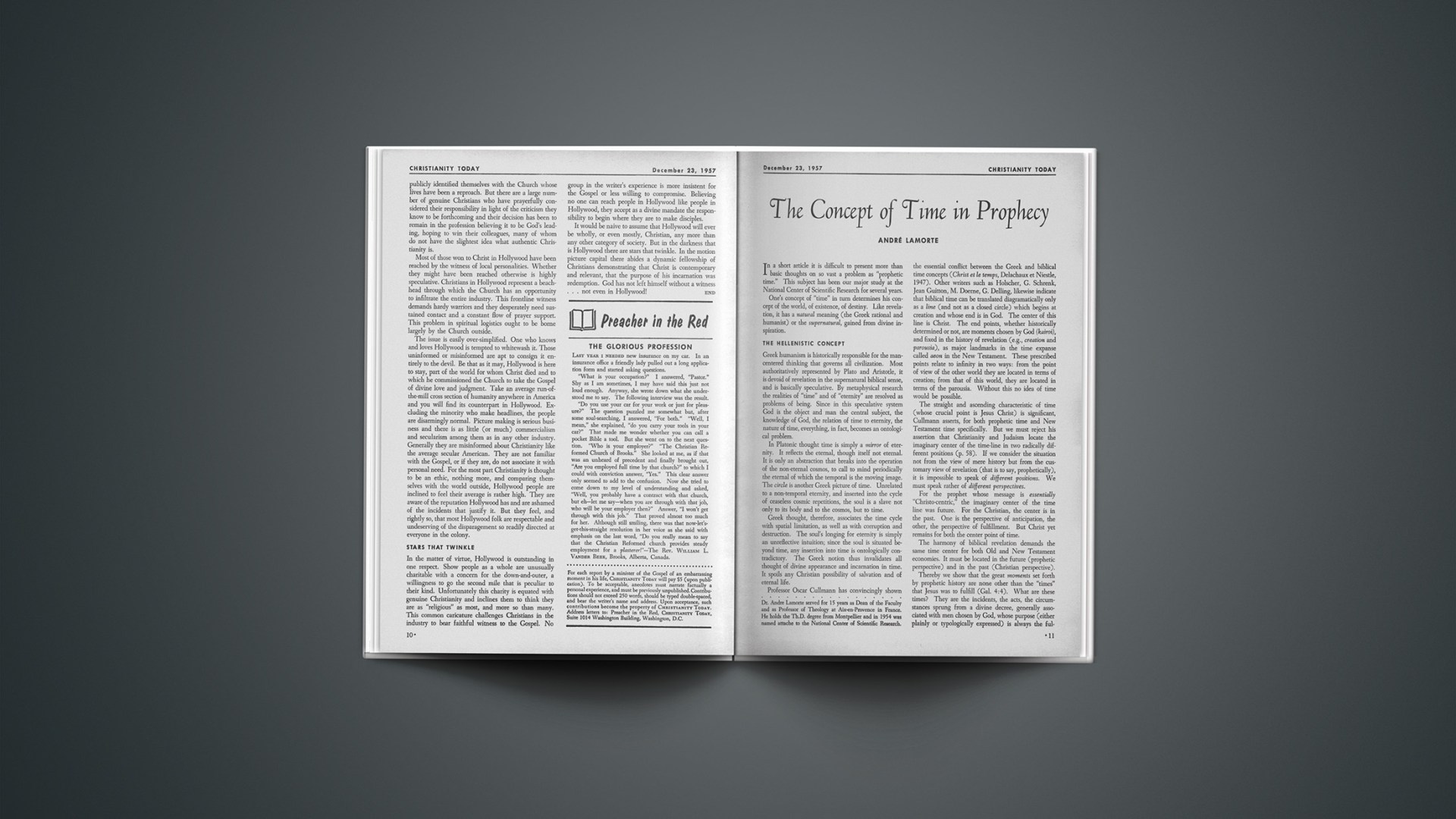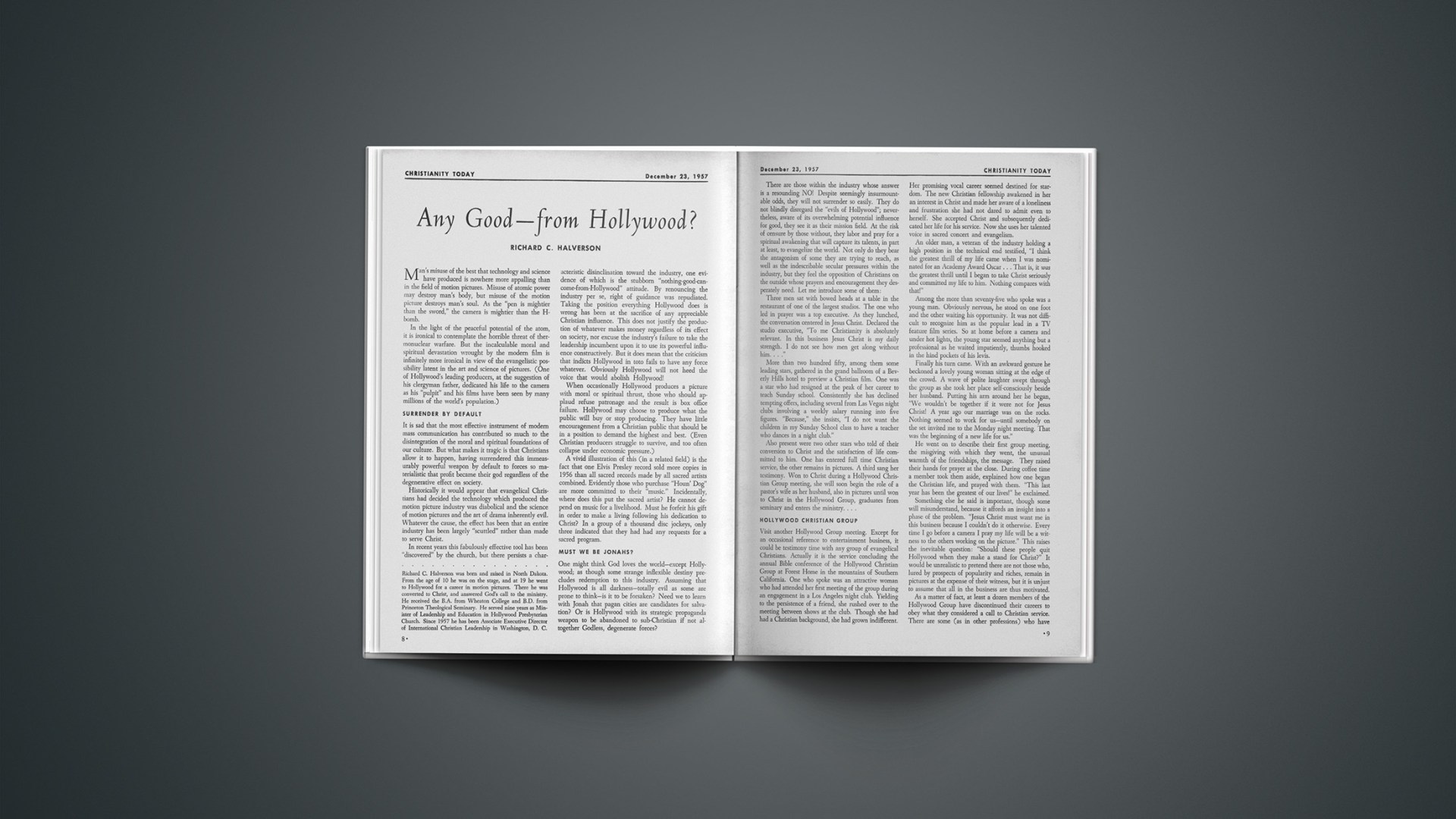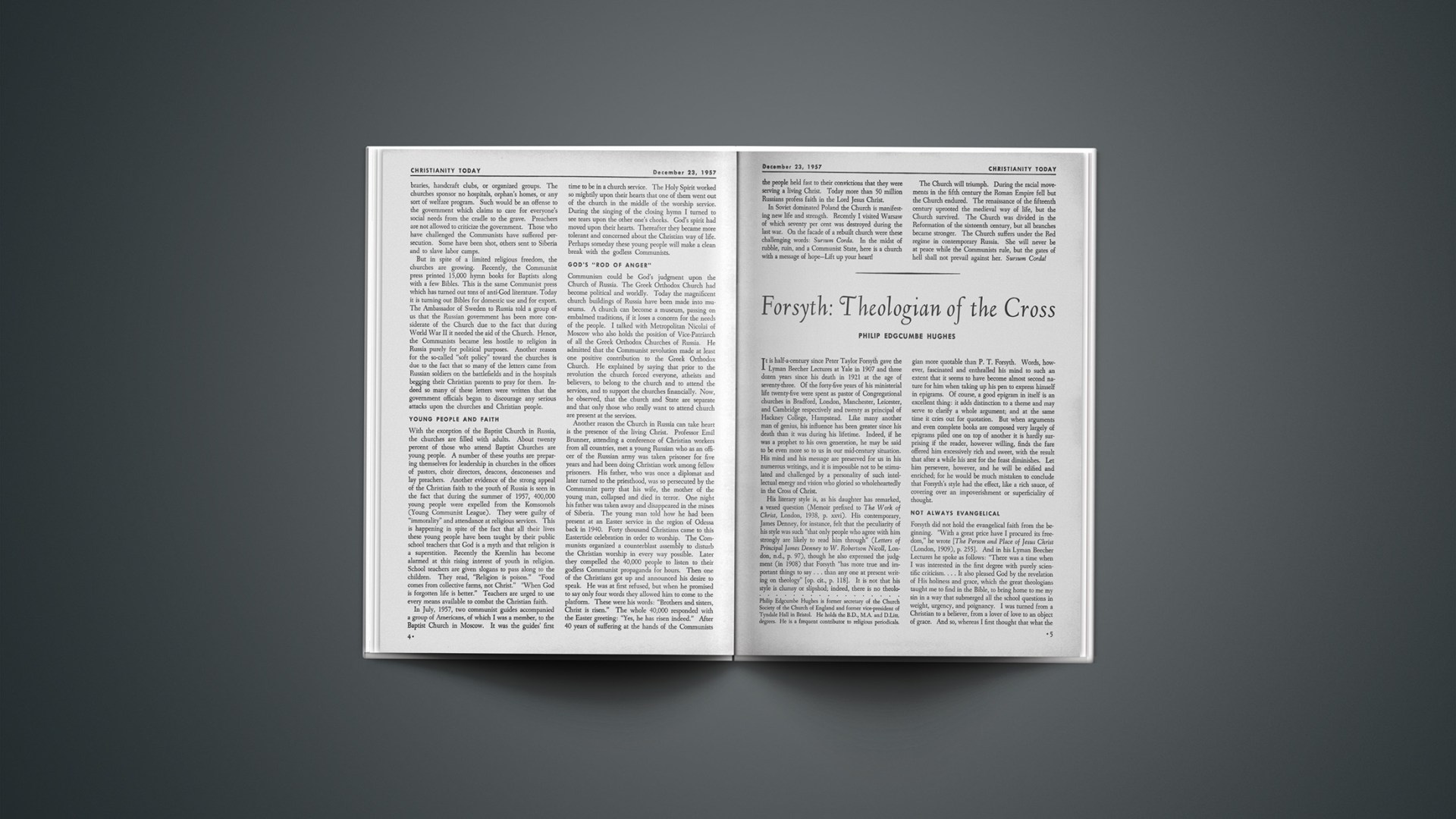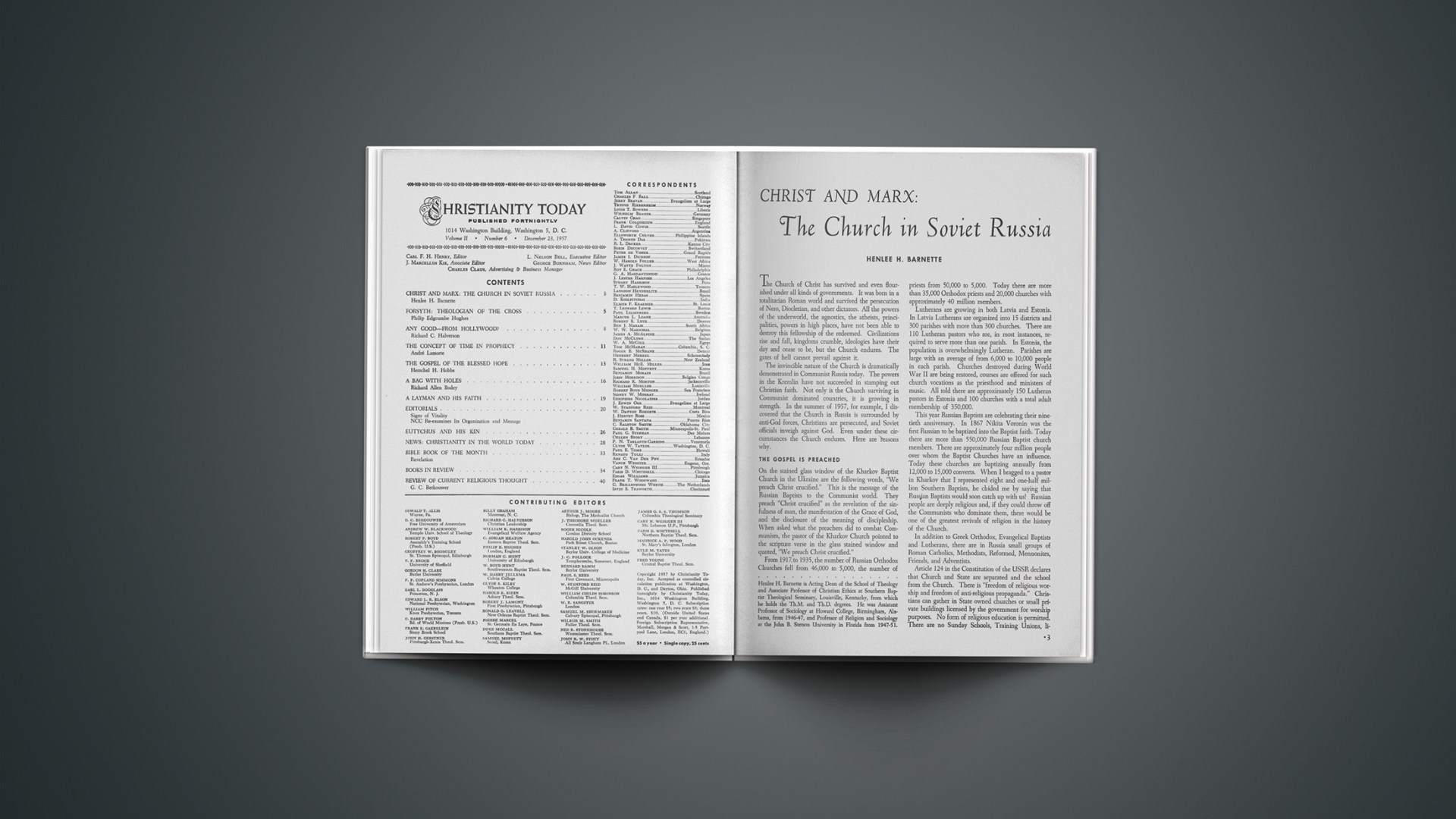THE GIFT OF GOD
Among the Christmas magazines on the newsstand, I found the cartoon cover. There was Billy Graham giving the sales pitch on a packaged mix labeled “Instant Salvation.” Dr. Ivy had described it in his luncheon talk. He regards Graham and TV commercials as a survival of the revivalists and medicine men of the frontier. Dr. Ivy is against magic, superstition, quack nostrums and panaceas. He is suspicious of all miracles except those of modern science.
When I remarked that “Instant Salvation” was hard, indeed, impossible to sell, he seemed puzzled. He admitted that he couldn’t be sold, but one cannot exaggerate the gullibility of mass man.
He is quite wrong. People are already sold on do-it-yourself salvation. It is another matter for a man to acknowledge that he can do nothing to gain salvation and to turn in penitence and faith to Christ.
“Instant Salvation” might outsell vitamins if it could be sold. But it must be given away. It is precisely impossible for the self-assured, prosperous American to enter the Kingdom as a spiritual pauper. The disciples asked, “Who then can be saved?” Jesus answered, “With men this is impossible, but with God all things are possible.”
Only by a miracle does a man receive salvation on God’s terms. It was by a miracle that this salvation was given. “Nothing is impossible with God,” said the angel to Mary. When Sarah heard the promise of her son she laughed. Even Zacharias before the altar doubted. But Mary bowed in faith. “Be it unto me according to thy word.” The Spirit who wrought in her womb wrought first in her heart.
Before the impossible gospel men still laugh in unbelief—foolishness! The foolishness and weakness of God. “Be it unto me according to thy word!”
EUTYCHUS
HOPE FOR THE YMCA
Of course the YMCA’s are concerned for public affairs and Christian citizenship; that is part of their purpose. In 1893 Robert McBumey, the dynamic secretary of the great New York City Association, said, “The best thing for you and me is to engage in earnest Christian work for the bodies and souls of men …” Theologically-minded critics of the YMCA must remember that it is a lay movement, that it has always addressed itself to men and boys where they were to be found, that it deliberately avoided theological and dogmatic pronouncements and ecclesiastical entanglements, and that it sought as a lay movement to supply those practical applications of Christian ethics which the churches could not or would not provide.
Your inference that the student branch of the Movement is like one Association you describe as “drifting in Unitarianism,” is totally at variance with the facts: since the early days of the Student Movement it has been the most spiritual and the most consistently devoted to the development of vital Christian faith of any one of the dozen major branches of this quite amazing and universal organization. Your inference that the Y has somehow been disloyal (“semi-socialist”) or unchristian by opening its platforms or forums to liberal or radical speakers (“world church”) is reminiscent of the protests raised by ultra-conservatives of another day when Dwight L. Moody (of whom you appear to approve) brought to an early Northfield student YMCA conference a scientist named Henry Drummond who was the first to apply what you disparage as “evolutionary theories to moral and spiritual realities.”
The material which you quote from Mr. Fisher (page 72) at the bottom of your third column is unfortunately misplaced, since he somehow used the revised form of the “Social Creed of the Churches” of 1932 out of context at this point in his narrative. In my History of the Y.M.C.A. in North America I inadvertently quoted him at this point; an errata sheet issued with the book endeavored to correct this. Hence I apologize on the part of both of us but at the same time question both your use of the material and your conclusion. In endorsing this statement, which you do not identify but infer was some set of wildeyed leftist YMCA notions, the Associations were as usual following the leading churches of the nation, since the “Social Creed” they approved in 1919 was that of the Federal Council of Churches and had then been widely publicized for a decade. But you have virtually changed the meaning of one of these phrases, which originally read “subordination of speculation and the profit motive.…” Why omit “speculation” in this day of legalized gambling?
In my estimation it is not “ironic” to to say that “the YMCA today stands as a vast mission field.…” It is rather a revelation of fundamentalist myopia and I fear ignorance. The “Paris Basis” of 1855, which you cite with apparent approval, was reaffirmed at the Paris centennial celebration in 1955. When the American Associations planned their centennial in 1951, the chief study manual for groups across the country faced the Movement with four imperatives: We must renew our Christian faith, rediscover our sense of Christian vocation, strengthen democracy, and seek world peace and unity. The negative inferences of your editorial are not justified by the facts. This kind of social concern, in spite of your assumption that it died with Moody, continues to be “rooted in the Gospel of Christ.”
A characteristic of the Movement that impressed me as I worked on its centennial history, was a broad and pervasive awareness of faults and deficiencies. Next to the Protestant clergy, the Association secretaryship is the most introspective professional body I have encountered, concerned continuously not only with self-improvement but with the purposes of the Movement. This evidence of the internal activity of the Protestant principle of creative criticism leads me to believe they will find their way back to a more positive Christian witness in the years ahead. I was critical of them in my History. But they published it (admittedly not without some fussing)! I think there is hope for them, especially as I read the literature of the World Movement as reflected in the World Alliance organ, World Communique. I suspect that you also hold this hope, but your editorial is a pretty backhanded way of saying so.
C. Howard HopkinsDeanStetson UniversityDeLand, Fla.
• The YMCA cannot be at one and the same time defended for theological naivete because it was a lay movement avoiding “ecclesiastical entanglements” and excused for social gospelism (including leftist tendencies) because it followed the social pronouncements of ecumenical leaders. CHRISTIANITY TODAY would welcome evidence that the majority of American YMCA’s still carry forward the original zeal of the London Association for prayer meetings, Bible study, personal evangelism, weekly offerings for missions, and that they pursue their interest in public affairs as a reflex of the thrust for personal acceptance of Jesus Christ as Saviour and Lord.—ED.
Re “Will the YMCA Recover its Gospel?,” the Mansfield News-Journal (Nov. 17, 1957) carries an illustrated feature article: “Jazz came to the Y last Sunday.… Some 80 spectators sat quietly …, listening almost religiously.… The Sunday afternoon session was something new and vital.…”
V.T.H.Mansfield, Ohio
We all hope that the YMCA can recapture its evangelistic fervor, and I feel that your article will be instrumental in causing a widespread evaluation of present trends in that organization.
N. H. McCrummenFirst Baptist ChurchSelma, Ala.
My reply to “Will the YMCA Recover Its Gospel” would be, No, not in the United States.… In my opinion, the American YMCA has evolved into a rather confusing paradox by attempting to relate itself to the Paris basis on one hand and at the same time.… no attempt to make the issues of this basis clear in our program.
We have been, and are, an opportunist movement, sensing the pressures of our community and then conforming to them. Unfortunately, while we were maturing into stable and effective community agencies and fellowships, the theological impact made upon us was liberalism. Consequently today our staff, boards, and committees are populated with men and women not sympathetic to evangelism. A constituent today has little chance of learning of Jesus Christ as Saviour and Lord through YMCA contacts.
It will be interesting to see how we fare in the next decade or so with neo-orthodoxy as today’s theological impact on the one hand, and the pressures of the Roman Catholic Church and its insistence that no Catholic be involved in our devotional and religious experiences on the other.…
We have nothing left but somehow to inculcate Christian ethics and to create a wholesome environment which we claim stems from Christian motivation of our staff. We find ourselves holding Christian by-products, but we’re embarrassed to claim they come from a Christian theology.…
Everett R. JohnsonAsst. Membership Secy.Y.M.C.A.Bridgeport, Conn.
I fully believe that the YMCA has done and is doing a great job in communities around the world. However, its members are united.… simply by a good social organization. This is worthy, but when taken alone seems barren in comparison to a movement born out of loyalty to Jesus Christ. Some of the men in the movement know next to nothing about the Bible, prayer, a vital church membership, and dedication to Jesus Christ.CLIFFORD V. ANDERSONBethel CollegeSt. Paul, Minn.Asst. Dean of Students
MORE ON SEPARATION
“What is Christian Separation?” … has statements … out of harmony with the Scriptures and is a menace to Christianity.… Dr. Cowie seems to hold that shows, card playing, dancing and such like are nonmoral. While the Bible may not mention all things that are wrong, it does give principles that the Christian must abide by. 1 John 2:15–16 says, “Love not the world, neither the things that are in the world.…”
T. A. Faulkner, ex-dancing master of Los Angeles, states that “Two-thirds of the girls who are ruined fall through the influence of the dance.” The matron of a home for fallen women in Los Angeles declares that “seven-tenths of the women who go there have fallen through the dance and its influence.” 300 prostitutes were questioned; 80% said they began their downfall through the dance.
C.E. DyeHolbrook Church of GodFlint, Mich.
Surely a Christian should … refrain from those things specifically condemned by the Scriptures and other things harmful to the spiritual welfare. Just as surely the condemning of “all appearances of evil” in others may lead some to pharisaical bigotry.… Bigotry itself is no mean sin as sins go.…
Weston HareWilmington, Del.
The major assertions and principles laid down are entirely right.… However, the mistake Mr. Cowie makes is that he places in the non-moral category some practises which actually involve morals.… Mr. Cowie seems to follow the idea that if something is not specifically named and condemned in the Bible it is non-moral. However, the laws or commandments of the Bible are to be applied wherever they fit.
Christianity is not being hindered to any great extent where I live by legalism, but is being paganized by the prevailing attitude, “If I think it is all right … no one should judge me.” Antimonianism is the real enemy.…
Raymond G. JohnsonFirst Baptist ChurchGlennville, Ga.
Legalism is a very prevalent disease in evangelical Christianity, especially in the fundamentalist context. This legalism breeds the worst kind of hypocrisy. It is my observation, however, that those churches which take pride in emphasizing the social freedom of the individual in the realm of shadow-revelation are all too frequently those churches which first have dissipated the lucid and fundamental teachings of the Scriptures (for example … regeneration … the real bodily resurrection.…). This is not to defend hypocritical legalism but it is to object to hypocritical freedom.…
C. W. BrightwellSutersville Presbyterian ChurchSutersville, Pa.
APOCRYPHAL WRITINGS
Dr. Metzger is condemned (by R. C. Wroten, Nov. 11 issue, p. 23) for leading people “to mistake the apocryphal writings for the written Word of God.” … The Episcopal Church is worse than timid Dr. Metzger. The Apocrypha is part of our official Bible and is required by our canon law to be in the Bibles used on the lecterns of our churches. Further, in churches where Holy Communion has not replaced Morning Prayer, the Apocrypha is read publicly in the church as the first lesson a number of times each year. Advancing from Dr. Metzger’s hesitant opinion, buttressed by John Bunyan, that some good may be found therein, the Episcopal Church boldly proclaims the Apocrypha in church, just as it does “the written Word of God.” Since the manner of announcing the reading of Holy Scripture is prescribed by rubric, no distinction or intonation would differentiate the reading of the Maccabees from Isaiah.…
Lewis SasseSt. Andrews Episcopal ChurchTucson, Ariz.



